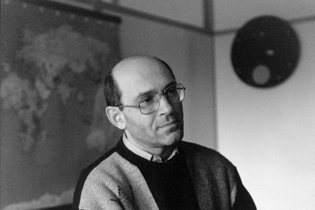Personal tools
News from ICTP 92 - Profile

ICTP Associate Ivane Murusidze remains optimistic that his native Georgia can regain its footing in science after a difficult period of transition.
Tradition and Transition

When ICTP Associate Ivane Murusidze leaves Trieste to return to his home in Tbilisi, Georgia, in early May, it will mark the end of his third visit to ICTP during the past six years. Murusidze, who is trained as a plasma physicist, is thankful for the opportunities that the Centre has provided him during a period of unprecedented change for both scientists and scientific institutions in his home country.
Georgia is one of the 'newly independent states,' located between
the Black and Caspian seas in the Caucasus, that re-emerged after
the collapse of the U.S.S.R. in 1991. "Our problems,"
Murusidze notes, "are similar to the problems faced by other
republics that belonged to the Soviet Union. Economically, we
now resemble a developing country, but scientifically we do not."
In fact, Georgia has a long tradition of excellence not only in
science but in other fields of inquiry--for example, history,
philosophy and the arts--that date back to the 12th century. "Our
culture has a deep and abiding respect for education," he
notes, "and that respect has found expression in the accomplishments
of our teachers, humanitarians, artists and scientists."
Murusidze cites the work of Elevter Andronikashvili, who served
as the director of the Georgian Academy of Science's Institute
of Physics between 1950 and 1988, as a prime example of his country's
enviable history of scientific excellence. Andronikashvili is
considered to have been one of the world's foremost condensed
matter physicists.
"Under communism," Murusidze says, "scientific
institutions were part of a large, politically powerful network
able to secure sufficient resources to sustain high-level research
in physics and many other fields."
"Today, however, we are in a period of transition. Our ties
to the Soviet system of science have been severed and we have
yet to develop a fully functioning market economy." As a
result, funding for scientific institutions has declined dramatically.
"In the late 1980s," Murusidze notes, "about 200
physicists worked at the Georgian Academy of Science's Institute
of Physics." Some former employees have retired, some have
moved to the West and some have migrated to other fields, notably
computer science and business. Despite the exodus, the scientists
who remain continue to do excellent work.
Murusidze acknowledges that the benefits he derives from his association
with ICTP "may be different from the benefits derived by
his younger colleagues from other parts of the world where scientific
institutions have not been strong."
At the same time, he maintains that "the benefits he has
received from his ties to the Centre are no less valuable."
ICTP is a "unique place that has enabled me to remain in
contact with colleagues who share my research interests. The Centre's
library and computer facilities have also proven invaluable. No
other single library in Europe houses as comprehensive a collection
of journals and monographs in physics and mathematics. Meanwhile,
the capacity and speed of the Centre's computer network has facilitated
my efforts in model building and simulations, which has proven
indispensable to my research. I owe a particular sense of gratitude
to Swadesh Mahajan, who has been course director of the College
in Plasma Physics for many years."
Murusidze's two major fields of research are nonlinear wave dynamics
in plasma and nonlinear optics in semiconductors. In the first
field, his research focuses on laser-plasma interactions at relativistic
(very high) intensities.
"Small-scale experiments in laser-plasma interactions,"
he notes, "have proven that lasers can be used to compress
and then ignite plasma. Scientists are now studying how the laser
pulses would interact with plasma on a large scale. The challenge
is that the relationship is nonlinear. Simply put, the pulse quickly
changes the material properties of the plasma, making the pulse
unstable."
Theoretical investigations into these areas require a first-class
research environment and state-of-the-art computer networks. "That's
why I've found my visits to ICTP so productive," Murusidze
says. "Being able to converse with colleagues and utilise
the Centre's facilities has helped push my research forward."
Despite the difficult period of transition Georgia has faced over
the past decade, Murusidze remains optimistic about his country's
future. "Young Georgians continue to come to our universities
to learn science and their families continue to value science
as a noble endeavour. These are encouraging signs for my country."